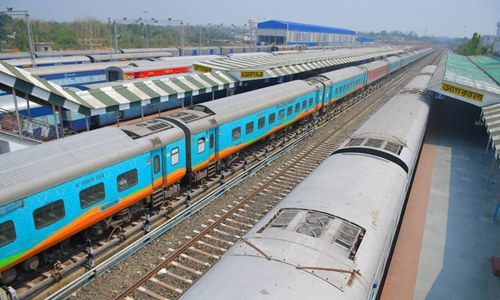BRI in line with India’s long-term development
Source:Global Times Published: 2020/6/2 12:13:40

A deserted view of a railway station during a countrywide lockdown in Agartala, the capital city of India's northeast state of Tripura, April 2, 2020. (Stringer/Xinhua)
The long-term economic development of India, an important developing country in the Asia-Pacific region, is in line with the China-proposed Belt and Road Initiative (BRI), which aims to promote shared development of countries and regions. With its infrastructure investment, the BRI could offer a great opportunity for India, which needs to shore up infrastructure in order to lure foreign investment and boost industrial development.
India has a strong economic complementarity with economies in East Asia and Southeast Asia, and being involved with the BRI or other regional cooperation partnerships such as the Regional Comprehensive Economic Partnership (RECP) fits its essential interests in the long run. Though India's economy has made good progress in recent years, weak infrastructure is still a major limiting factor.
Since 1991, India has launched a series of vital economic reforms, but the country still maintains some typical macro-economic characteristics of developing countries, especially its high levels of financial deficit, trade deficit and price volatility, leading its economy to see large fluctuations when it encounters external shocks.
Luring foreign investment and enhancing infrastructure could be two ways for India to tackle the imbalance issues in its economy. Currently, insufficient infrastructure is one of its critical shortcomings. For instance, weak transport facilities result in higher logistics costs, which hinders foreign investment and others. India's labor and land-related laws also need to be improved in order to facilitate the development of its manufacturing sector.
Though the BRI could bring in foreign investment for infrastructure projects in India, the country has shown an uncertain attitude toward joining the initiative. India is concerned that its advantage in regional economic development might be impacted by the BRI, but the country recognizes the benefits from the BRI and has been involved in certain number of BRI projects.
In fact, the BRI aims to realize shared growth. Under the BRI framework, countries and regions can further improve economic cooperation based on enhanced infrastructure, which is a new development pattern and is essentially different from the colonialists' global expansion in history.
As the world has been drawn into a deadly pandemic, countries and regions are trying to recover growth after the huge hit from the virus. The region around the Indian Ocean is an important area for the BRI. India plays a vital role in the area both in terms of historical and cultural traditions and in terms of its economic and trade activities. The coast of India used to be an important part of the Maritime Silk Road, and now there is a promising opportunity to restart the journey.
In 2018, India reportedly became the world's third-largest economy following China and the US in terms of purchasing power parity. The year 2020 marks the 70th anniversary of the establishment of diplomatic ties between China and India. As two ancient civilizations and the two largest developing countries in the world, China and India have great potential for communication and strategic cooperation, both in terms of history and culture and in terms of economic development strategies. The two nations have launched cooperation in combating COVID-19 as well.
As the fallout of the epidemic on the Indian economy continues to emerge, India may need to further promote economic reform and is expected to introduce more major adjustment in economic diplomacy. A more open attitude toward regional cooperation would be an ideal choice for the country in terms of its long-term national interests.
The article was compiled based on an interview with Feng Junxin, a research fellow with the National Academy of Development and Strategy under the Renmin University of China. bizopinion@globaltimes.com.cn
Posted in: EXPERT ASSESSMENT